SketchUp Artists is a website that provides a ton of "beyond SketchUp" information, such as tutorials on rendering applications and techniques for presentation. They also have a Styles page where you can download some beautiful styles created by talented SketchUp pros around the world.
As an example, I downloaded the first style on the page ("Style 5" by Jean-Luc Clauss):
Clicking on the image on the Styles page enables you to save the style as a ZIP file. Extract the file it contains into one of the folders wtihin the Styles folder of your SketchUp installation.
In my case, I created a "JLC" folder (for Jean-Luc Clauss) inside my Styles folder.
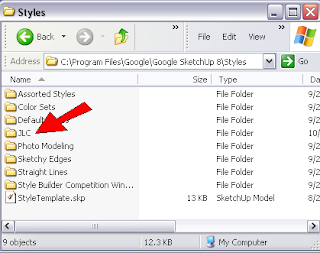
And the "Style05.style" file was extracted into the JLC folder.
When opening SketchUp, I located the JLC folder within the main Styles collection of the Styles window:
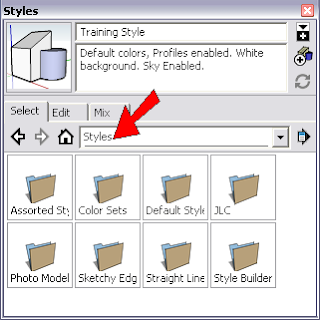
Opening the JLC folder shows the style I placed inside.
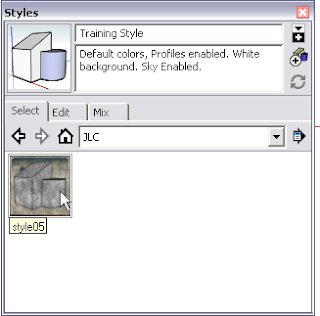
Here's a model I downloaded, which is shown in SketchUp's default style.
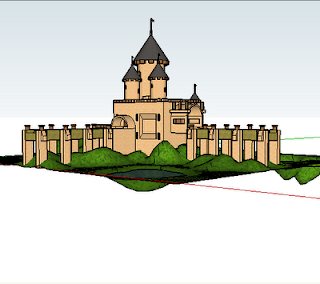
Clicking the "Style5" thumbnail transforms the model into a rather stunning non-photorealistic presentation, complete with a neat Japanese-style mountain and tree in the background.
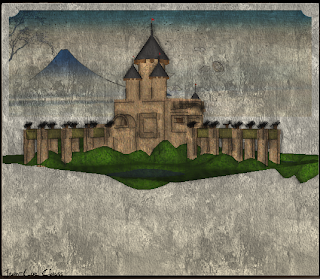
Anyone can design anything in 3D! http://www.3dvinci.net/

15 comments:
This doesn't work for me. I'm on a Mac, so maybe it's different, but the .zip file unzips a couple of folders and some .xml files. I put the folder containing them into the Styles folder, and I can't see the style - just a folder named "ref."
Thanks for visiting Bonnie and what a great artistic image you have there. Also great explanation/visual on how to get your new Styles into SketchUp and using them, we get many asking those very questions...
Joseph, i just tried it on my Mac and it seemed to work ok. In the ZIP file I just had the one style folder. Did you click on the image of the style itself?
There wasn't an image in the folder. I read somewhere that I had to rename the .zip extension to .style and then it would work, but nothing showed up in the Styles panel. I'm completely stumped.
Hi. For style05 enable the shadow to have a better result. And adjust field of view to have a nightmare scene.
Jean-Luc, thanks for stopping by! You're right, a shadow would have looked better :-)
...also usefull to adjust shadow (darkness, light...) to have a painting effect. And composition of course is very important.
Joseph, I think renaming the file won't work, you need to extract and place the "style" folder in the right place. If you email me the ZIP file, I can see if it looks different than what I saw? bonnieroskes@gmail.com.
I'm with Joseph on this one. Once I unzip all I get is a folder with a .png, 3 .xml files and a ref folder. And in the ref folder are just .png anf .jpg files. There is no .style file to be scene.
Bonnie,
For some reason, Archive Manager (built in to the Mac OS) extracts the .zip file in wrong way. When I extracted the file using BetterZip, it extracted into the correct .style file. From there, I was good to go! Thanks for your help, and the links! I now have a TON of new styles to play with!
About Style 05, I wanted to write: "enable the fog" and adjust it as well, this is the most important.
Bonnie the link to our Styles page appears to be broken here is the new one: http://www.sketchupartists.org/presentations/google-sketchup-styles/
On a Mac it's good to use Zipeg to unzip the style(s)
Hope it helps!
Hello Bonnie, great site. Is there any pluggin that turns a SketchUp file into an AutoCAD file? Thank you very much for all your help.
SketchUp Pro has a DXF/DWG export feature. If you're using the free version, I don't know of any direct plugins, but you could try opening the SU file in something like Blender. Looks like there are some free utilities to convert Blender models into A-Cad. Never tried it though.
Post a Comment